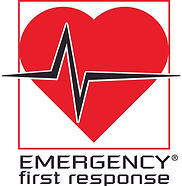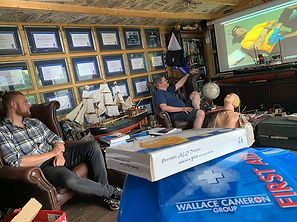
EFR Courses
Emergency First Response





A PRACTICAL HANDS-ON COURSE
The EFR (Emergency First Responder) Course is a practical hands-on course that is both rewarding and fun. In addition to learning invaluable life-saving skills, such as how to perform CPR and use a AED (Automated External Defibrillator) you will also learn basic first aid, bandaging and how to undertake a patient injury & illness assessments.
The course is a prerequisite for Rescue Diver and skills should be refreshed every 2 years.





EMERGENCY FIRST RESPONSE PRIMARY CARE - CPR
Emergency First Response Primary Care (CPR) teaches participants how to respond to life-threatening emergencies. The course focuses on primary care through a combination of knowledge development, skill development and realistic scenario practice to make sure participants have the confidence in their ability to provide care when emergency situations arise.
Primary Care (CPR) skills taught in this course:
-
Scene Assessment, Barrier Use, Primary Assessment, Cardiopulmonary Resuscitation (CPR), Serious Bleeding Management, Shock Management, Spinal Injury Management, Conscious and Unconscious Choking Management.
-
Recommended Skills
– Automated External Defibrillator (AED) Use
– Emergency Oxygen Use.
EMERGENCY FIRST RESPONSE SECONDARY CARE - FIRST AID
Emergency First Response Secondary Care (first aid) covers injuries or illnesses that are not immediately life threatening. Participants focus on secondary assessment and first aid through knowledge development, skill development and realistic scenario practice.
Secondary Skills taught in this course:
-
Injury Assessment
-
Illness Assessment
-
Bandaging
-
Splinting for Dislocations and Fractures
Includes first aid treatment reference for the following emergencies:
Allergic Reactions (incl. anaphylaxis), Asthma, Bruises, Burns, Chemical Burns, Choking (adult, child, infant), CPR (adult, child, infant), Cuts, Dental Injuries, Diabetic Problems, Dislocations and Fractures, Electrical Injuries, Eye Injuries, First Aid Kit Assembly, Fish Spine Injury, Frostbite, Heat Exhaustion, Heatstroke, Heart Attack, Hypothermia, Insect Stings, Jellyfish Stings, Octopus Bites, Poisoning, Scrapes, Seizures, Snake Bites, Spider Bites, Sprains and Strains, Stroke, Temperature Related Injuries and Venomous Bites and Stings.
EMERGENCY FIRST RESPONSE CARE FOR CHILDREN
The Emergency First Response Care for Children course is an innovative CPR, AED and First Aid training course that teaches participants how to provide emergency care for injured or ill children (ages one to eight) and infants less than one year old. Participants learn about the types of medical emergencies that children face, and how they differ from adults. The curriculum also includes the importance of attending to basic emergency situations with children, the emotional aspects of caring for children, secondary care for children, and preventing common injuries and illnesses in children.
The Emergency First Response Care for Children course trains the lay rescuer to follow the same priorities of care used by medical professionals. The student masters the priorities and the procedures of patient care for infants and children in a non-stressful learning environment, which reduces the performance anxieties that interfere with learning and enhances confidence when rendering aid in a real medical emergency.
The course includes both primary care (CPR) and secondary care (first aid) skills. The primary care portion of the course prepares the rescuer to help an infant or child with a life-threatening emergency such as choking or cardiac arrest. Secondary care focuses on developing first aid skills and building the rescuer’s confidence to help an infant or child in need when emergency medical services are either delayed or unavailable. The Care for Children course content is based on guidelines from the Pediatric Working Group of ILCOR.
Care for Children Primary Care Course Content:
-
Scene Assessment, Barrier Use, Primary Assessment, Cardiopulmonary Resuscitation (CPR, child and infant), Serious Bleeding Management, Shock Management, Spinal Injury Management, Conscious and Unconscious Choking Management (child and infant)
-
Recommended Skill
– Automated External Defibrillator (AED) Use (child)
Care for Children Secondary Care Course Content:
Injury Assessment
Bandaging
Illness Assessment.
EMERGENCY FIRST RESPONSE CPR & AED
The Emergency First Response CPR & AED course teaches the basic principles of CPR and how to deploy and use an Automated External Defibrillation (AED) in an emergency situation. This life saving device can increase a patient’s chance of survival from a cardiac arrest by fifty percent.
This course is very popular for annual CPR (re-)training often required for the workplace.
EMERGENCY FIRST RESPONSE REFRESHER COURSES
Time to refresh your CPR and first aid skills? Do you hold a CPR or First Aid certificate from another training organization? If so, you are eligible to attend the Emergency First Response Refresher course. Plus, you can get Automated External Defibrillator (AED) training at the same time you refresh your CPR skills.

INSTRUCTOR COURSES
During the Emergency First Response Instructor course, you will build on your skill as an Emergency Responder and focus on developing your instructional abilities to teach these skills to others. The Instructor course provides you with the additional training necessary to teach the Emergency First Response Primary Care (CPR), Secondary Care (First Aid), Care for Children, CPR & AED courses. (Most region-specific workplace courses require additional training.) Through a multi-media approach of independent study, classroom sessions and practical teaching assignments, you learn to conduct Emergency First Response courses.
The instructor course covers specific goals and performance requirements for the Primary Care, Secondary Care, Care for Children and CPR & AED courses, along with instruction on how to structure learning, the requirements of performance-based training, and your role as the instructor in the learning environment. You also learn how to motivate students, evaluate student knowledge, present course content effectively, become proficient in developing students’ hands-on skills practice sessions, and are taught how to present an effective scenario-based learning experience. You’ll also receive information helpful in marketing your EFR business.
Prerequisites:
To enter the Emergency First Response Instructor course, you must be 18 years old and have completed CPR and first aid training in the past 24 months or a be a practicing medical professional such as a physician, Emergency Medical Technician, Paramedic or Registered Nurse.
In addition to the standard EFR courses, divers should undertake the following PADI courses or their equivalent:
PADI - EMERGENCY OXYGEN PROVIDER COURSE >>
Knowing how and when to administer emergency oxygen is a valuable skill to have in a dive emergency.
The PADI Emergency Oxygen Provider prepares you to offer aid and teaches you to recognize scuba diving injuries and illnesses requiring emergency oxygen.
This is an excellent course for scuba divers, boat crew, lifeguards, freedivers, or anyone who spends time in and around water. No age restrictions or water sessions required.
Any club member wishing to do a PADI RESCUE DIVER Course with the club will be advised to complete this course, as well as the EFR course, in advance of enrolling on the Rescue Diver course..
The PADI Rescue Diver course will change the way you dive – in the best possible way. Learn to identify and fix minor issues before they become big problems, gain a lot of confidence and have serious fun along the way.
Discover why countless divers say Rescue Diver is their favorite scuba course.
Commencing EFR & Rescue Courses
Any club member wishing to undertake any EFR or Rescue courses should first speak with either the club Training Officer or the Diving Officer to ascertain if they meet any appropriate pre-requisites and to check course availability / when the next course is running.
“SOMEWHERE ALONG THE WAY, WE MUST LEARN THAT THERE IS NOTHING GREATER THAN TO DO SOMETHING FOR OTHERS.”
— Martin Luther King Jr.

